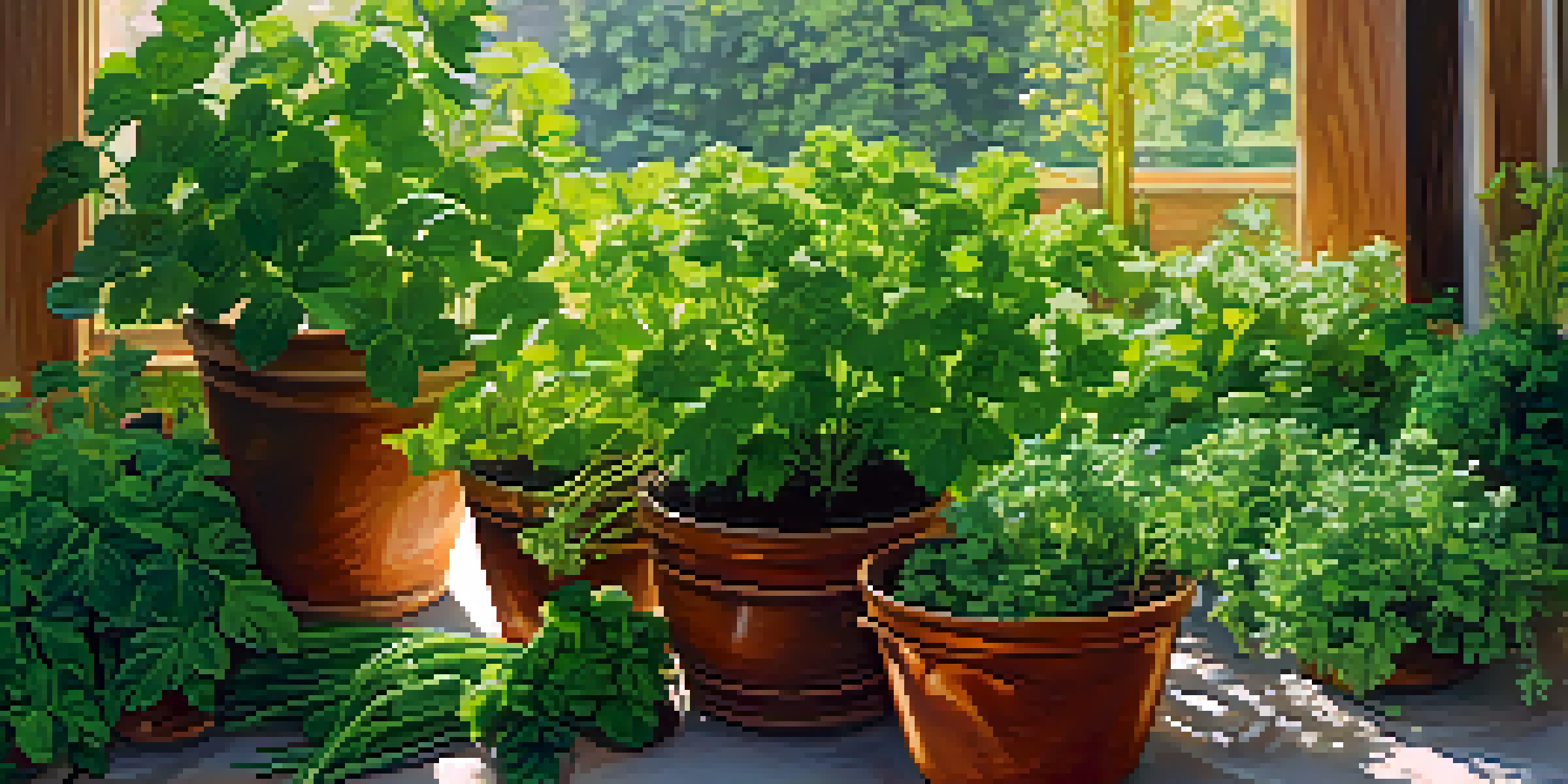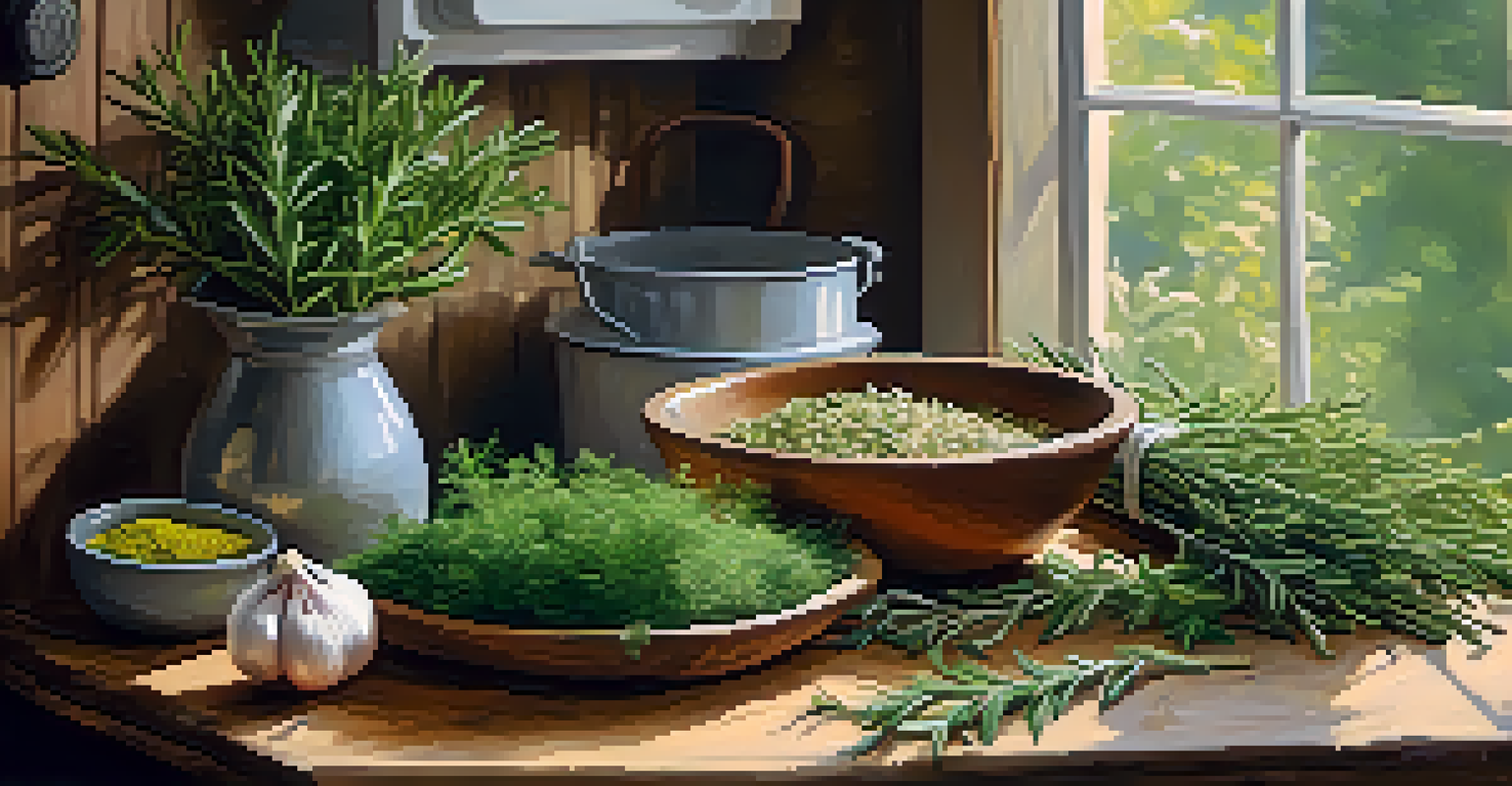Herb Gardening for Health: Nutritional Benefits

Understanding the Nutritional Power of Herbs
Herbs are not just flavorful additions to your meals; they are packed with nutrients that can significantly enhance your health. Many common herbs, such as basil, parsley, and cilantro, contain vitamins and antioxidants that support various bodily functions. For instance, parsley is an excellent source of vitamin K, which is essential for bone health and blood clotting.
Herbs are the great gift of nature to mankind, and the health benefits of these plants are profound.
Moreover, herbs can provide anti-inflammatory properties, which are crucial for preventing chronic diseases. Turmeric, for example, contains curcumin, a compound known for its ability to reduce inflammation and combat oxidative stress. By incorporating these nutrient-rich plants into your diet, you can enjoy a range of health benefits without needing to take supplements.
Additionally, growing your own herbs allows you to control what you consume. You can avoid pesticides and chemicals commonly used in commercial herb farming, ensuring that your herbs are as healthy as they can be. This not only enhances your culinary experience but also contributes to a healthier lifestyle overall.
The Role of Herbs in Boosting Immunity
Immunity plays a critical role in our overall health, and certain herbs can provide a natural boost to your immune system. For example, echinacea is well known for its immune-boosting properties and is often used to prevent colds and flu. Incorporating such herbs into your diet can help your body fend off illnesses more effectively.

Garlic is another powerful herb that has been praised for its immune-enhancing effects. It contains allicin, a compound that can help to fight infections and reduce the severity of colds. By adding raw or cooked garlic to your dishes, you can enjoy its health benefits while enhancing the flavors of your meals.
Herbs Boost Nutritional Value
Herbs are nutrient-rich additions to your meals, providing essential vitamins, antioxidants, and anti-inflammatory properties that enhance health.
Moreover, herbs like ginger and oregano are rich in antioxidants, which can help to combat harmful free radicals in the body. This, in turn, can lead to a more robust immune response. By cultivating a variety of herbs, you not only improve your dishes but also provide your body with the tools it needs to stay healthy.
Herbs as Natural Remedies for Common Ailments
For centuries, herbs have been used in traditional medicine to treat various ailments. Peppermint, for instance, is often used to soothe digestive issues and relieve headaches. Drinking peppermint tea can provide quick relief, making it a go-to remedy for many.
Let food be thy medicine and medicine be thy food.
Similarly, chamomile is celebrated for its calming effects and is frequently used to promote relaxation and improve sleep. A warm cup of chamomile tea before bedtime can help you unwind and prepare for a restful night. Having such herbs on hand can be a natural way to address everyday health concerns.
Additionally, many herbs have antimicrobial properties that can help fight infections. For example, thyme has been used to treat respiratory infections thanks to its ability to kill bacteria and viruses. By growing your own medicinal herbs, you can create your own remedies right from your garden.
Enhancing Flavor While Reducing Salt Intake
One of the most significant benefits of using herbs in your cooking is their ability to enhance flavor without the need for excess salt. This is particularly important as high sodium intake is linked to various health issues, including hypertension. By substituting herbs for salt, you can enjoy flavorful dishes while supporting your cardiovascular health.
For instance, rosemary and thyme are robust herbs that can add depth to meats and vegetables, making them satisfying without relying on salt. Similarly, fresh cilantro can brighten up salsas and salads, offering a fresh taste that complements many dishes.
Herbs Support Immune Function
Certain herbs, like echinacea and garlic, can naturally boost your immune system and help fend off illnesses.
Being mindful of salt intake is crucial, and herbs can help you achieve that goal deliciously. As you experiment with different herbs in your cooking, you'll likely discover new flavor profiles that you love, all while making healthier choices in your diet.
Herbs and Their Role in Heart Health
Heart health is vital for overall well-being, and certain herbs can contribute positively to cardiovascular function. For example, basil is known not just for its flavor but also for its ability to help lower cholesterol levels, which is crucial for heart health. Incorporating basil into your meals can be an easy way to care for your heart.
Another herb to consider is dill, which contains compounds that may help regulate blood pressure. By including dill in your recipes, you can enhance flavor while supporting your heart. These small dietary changes can have a meaningful impact on your long-term health.
Additionally, herbs like cayenne pepper can improve circulation and promote heart health. By adding a bit of spice to your dishes, you're not only making them more exciting but also working towards better heart health naturally.
Herbs for Digestive Health and Wellness
Digestive health is crucial for overall wellness, and many herbs can aid in improving digestion. Ginger is well-known for its ability to relieve nausea and promote digestive comfort. Incorporating ginger into your diet, whether through teas or as a spice, can make a significant difference.
Fennel is another herb that can help alleviate bloating and gas. Its unique flavor can enhance dishes like salads and soups, providing digestive relief while adding a delicious twist. By choosing herbs that support digestive health, you create meals that feel good in more ways than one.
Grow Your Own Herbs Sustainably
Cultivating a personal herb garden not only gives you fresh ingredients but also contributes to healthier eating habits and sustainability.
Moreover, peppermint is often used to soothe upset stomachs and improve digestion. A simple peppermint tea after meals can help settle your stomach and promote better digestion. With these herbs in your garden, you’ll have natural solutions at your fingertips.
Creating a Sustainable Herb Garden for Health
Creating your own herb garden is not only rewarding but also beneficial for your health. Whether you have a spacious backyard or just a small balcony, you can grow a variety of herbs. Starting with easy-to-grow options like basil, mint, and chives can help you get accustomed to gardening while reaping the nutritional rewards.
Having a personal herb garden ensures that you have fresh herbs available whenever you need them. This accessibility can encourage you to cook more at home, leading to healthier eating habits. Plus, gardening itself can be a therapeutic activity that reduces stress and promotes overall well-being.

Finally, growing your own herbs contributes to sustainability. By reducing reliance on store-bought herbs, you minimize packaging waste and support local biodiversity. It’s a small step that can lead to a healthier you and a healthier planet.